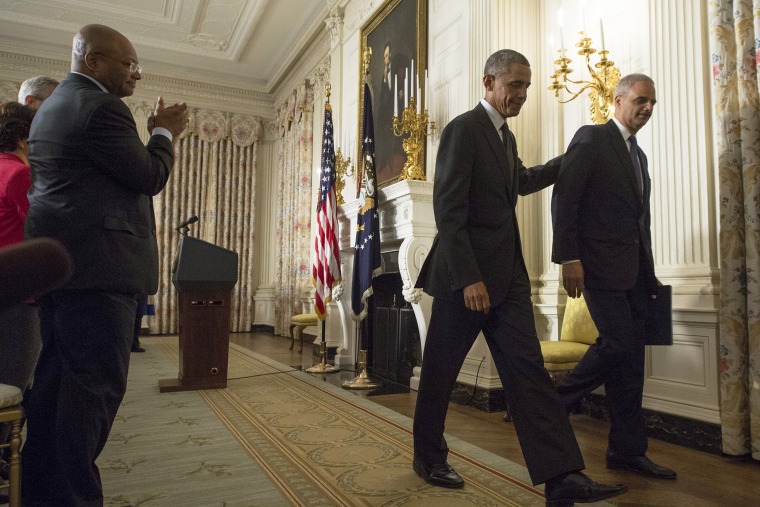After nearly six years as U.S. attorney general, Eric Holder will step down from his post as the head of the Justice Department. Holder, America's first-ever African-American attorney general, leaves behind a long legacy that includes enforcing civil rights, protecting the rights of the LGBT community, and advocating for equal access to all Americans at the ballot box.
President Obama thanked Holder for his tireless service Thursday saying he made "sure that those words, 'life, liberty, and the pursuit of happiness' are made real for all of us."
"He believes, as I do, that justice is not just an abstract theory, it’s a living and breathing principle," President Obama said.
Related: Republican lawmakers react to news of Eric Holder’s resignation
Here is a look at the top five most memorable chapters in Holder's tenure as America's top lawyer.
1. Ferguson
In the aftermath of the shooting death of Michael Brown at the hands of Darren Wilson, a white police officer in Ferguson, Mo., Attorney General Holder launched a Justice Department investigation. As citizens of Ferguson took to the streets in protest, Holder promised them his department would "in a fair and thorough manner" learn "exactly what happened."
In late August, a few weeks after Michael Brown was killed, Holder visited Ferguson. During a meeting with college students, he told them, “I am the Attorney General of the United States. But I am also a black man.”
He also detailed his own unjust experiences at the hands of police. “I can remember being stopped on the New Jersey Turnpike on two occasions and accused of speeding. Pulled over... 'Let me search your car'... I remember how humiliating that was and how angry I was and the impact it had on me.”
2. Commitment to voting rights
As attorney general, Eric Holder called the right to vote "the most basic of all our rights." While speaking of the Obama administration's plan to join voting rights cases in Ohio and Wisconsin in July, Holder vowed, "I will use every power that I have, every ability that I have as Attorney General to defend that right to vote."
That same month, Holder said in an interview with The New Yorker, "The history of this nation has always been to try to expand the franchise. Whether it’s freed slaves, women, young people, we’ve always found ways to make it easier to vote."
In August of 2013, the DOJ sued the state of Texas over its voter ID law. In a statement at that time, Holder said, "This represents the Department's latest action to protect voting rights, but it will not be our last."
As the head of the Justice Department, he also called for an end to state laws that bar felons from being able to vote even after being released from prison. At a George Washington University forum in February, Holder said such laws "increase the likelihood that they will commit future crimes." Noting these laws often have their roots in outdated visions of justice, Holder added, "The impact of felony disenfranchisement on modern communities of color remains both disproportionate and unacceptable."
3. Fast and Furious
Another notable chapter of Holder's tenure is the controversy surrounding a botched gun-running operation in Mexico known as "Fast and Furious." Some Republican lawmakers and conservative critics of the attorney general sought to make the controversy into a scandal that would be Holder's undoing.
In June of 2012, Chairman Darrell Issa's (R-Calif.) House Oversight Committee voted along party lines to hold Attorney General Holder in contempt of Congress for refusing to turn over certain documents after the Obama White House invoked executive privilege to shield those documents from lawmakers. On June 28, the full House voted 255-67 to place Holder in contempt of Congress.
Holder's contempt hearing will still proceed the Washington Times reported Thursday, despite the fact that a report by the Justice Department's Inspector General found there is "no evidence" that Holder had any knowledge of the botched "Fast and Furious" operation before Congress began pressing for information in early 2011.
4. Advocating sentencing reforms
During his tenure, both Eric Holder and his boss, Pres. Obama, have talked about the disproportionate impact America's criminal justice system has on minority communities. In August of 2013, Holder announced new changes in prosecutorial guidelines involving non-violent drug offenses. The move was meant to do away with harsh mandatory minimum sentences for minor drug offenses.
Holder's announcement also came at the same time legal scholars and civil rights activists were decrying the so-called "Stop-and-Frisk" policy used by New York City police.
Speaking in January with msnbc's Ari Melber, Holder said he hoped when looking back at his legacy that he could say he wasn't just "tough on crime, but smart on crime."
5. Declares DOMA unconstitutional
Eric Holder will also be remembered for throwing the full weight of the Justice Department behind the LGBTQ rights movement. In February 2011, Attorney General Holder announced that he had recommended, and Pres. Obama had agreed, that the Defense of Marriage Act was unconstitutional. Therefore, the administration would no longer seek to defend the law in court.
A statement from Holder noted that a "documented history of discrimination" was one of the key reasons for the change in policy.
The Supreme Court would eventually catch up to the attorney general on this point, declaring DOMA unconstitutional on June 26, 2013, in a 5-4 decision.
Related: Holder's legacy on civil rights
Holder's place in American history is forever secured as the first black attorney general, serving for the nation's first black president. Standing on the steps of the Lincoln Memorial on the 50th anniversary of the March on Washington, Holder gave a speech that seemed to deftly sum up his own stated goals as attorney general. He told the assembled crowd, "Their march is now our march."
